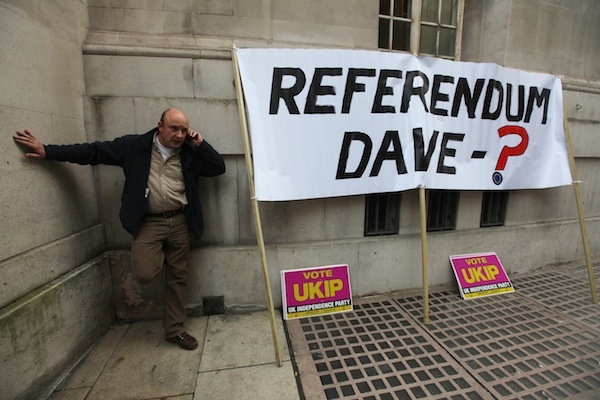Has David Cameron now shot the UKIP fox? The Prime Minister has now put a referendum on the political agenda. No.10’s thinking, as revealed by James Forsyth weeks ago, is that the weekend’s high-profile posturing will see off the UKIP threat. The PM has given it a decent amount of welly in the Commons today too, calling for a ‘fresh deal’ and ‘fresh consent’ on Europe. We can take this to mean renegotiation followed by a referendum on membership. But today, Cameron also made clear he’d campaign for an ‘in’ vote, stating:
‘I don’t believe leaving the EU would be right for Britain, but nor do I believe voting to maintain the status quo would be right either.’
Ed Miliband is unlikely to outflank him on this, so all Westminster major parties will remain committed to the idea of EU membership. And this is what puts them massively out of kilter with the British public opinion. To listen to the BBC’s coverage, you’d think the only folks who dislike EU membership are the ‘Tory right’ and that mainstream public opinion is to stay in the EU. It’s worth remembering that if you want to remain in the EU you are in a small minority in Britain. The latest Eurobarometer poll, conducted by the European Commission, highlights the divide between the public’s view of and that of Westminster:

In particular, it is worth noting that the proportion of the population with a negative view of the EU far outstrips any other nation:

Cameron is no doubt aware that his most successful act as Prime Minister so far was his veto in Brussels, and this latest piece of political theatre is another attempt to capitalise on the growing anti-EU sentiment highlighted in the charts. Cameron told the Commons that the turmoil in the Eurozone was an ‘opportunity to build the sort of settlement we want’. It could be, of course, that he negotiates a new EU deal which the public is happy with. But if he wants to see off UKIP, then he will have to close the gap between his government’s position on Europe and mainstream British public opinion. Simply supporting a referendum may not be enough.






Comments